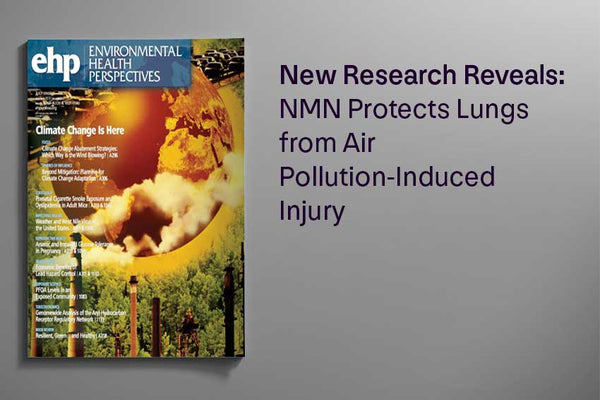
The study titled "Assessing the Effects of Nicotinamide Mononucleotide Supplementation on Pulmonary Inflammation in Male Mice Subchronically Exposed to Ambient Particulate Matter" was published in the magazine "Environ Health Perspect" in July of 2023. The comprehensive research conducted by Shen Chen and his team from China effectively examined the potential protective effects and mechanisms of Nicotinamide mononucleotide (NMN) in relation to lung injuries. The study can be found here.
In essence, the study aimed at assessing the capabilities of NMN in protecting against the harmful effects of chronic exposure to particulate matter (PM). To comprehensively address this, the team used six-week-old male mice as test subjects and provided them with NMN infused water for 16 weeks. To establish the connection between NMN and PM induced lung injuries, they applied single-cell RNA transcriptomic sequencing analysis and evaluated the changes in the subjects’ pulmonary inflammations.
The results from this study highlighted that NMN was successful in increasing NAD+ levels in the various tissues of the male mice, consequently reducing the levels of pulmonary inflammations and collagen depositions resulting from the detrimental exposure to PM. In other words, the supplemented mice had less PM-induced lung injury compared to the non-supplemented control group. More so, the NMN from the supplemented male mice was found to improve immune functions by lessening profibrotic cytokines and inhibiting the interleukin-17 signaling pathway. Notably, there were fewer amounts of monocyte-derived cells, fibroblasts, neutrophils, and myeloid-derived suppressor cells induced by the prolonged exposure to PM in mice that were given NMN.
Furthermore, the study noted a significant decrease in differentiated myofibroblasts and profibrotic interstitial macrophages in the NMN-supplemented group exposed to PM. There was also noticeable intracellular lipid metabolism activation resulting in less immune function suppression and altered differentiation of pathological cell phenotypes.
In conclusion, the findings posited by this study suggested that NMN supplementation could help by mitigating PM-induced lung injuries, improving lipid metabolism, and regulating immune functions in male mice. The NMN supplementation could, therefore, be potentially used as preventive intervention against adverse health complications associated with chronic PM exposure, although further tests are needed.
